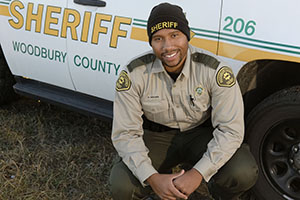Man in the Middle
BY BEN BROWN '10

JERRY MENNENGA
It's a very challenging time to be a law enforcement officer—and a black man. It seems nearly every week we hear a new story of a black male shot by a cop. The relationship between police and civilians is worse than it has been for a long time, and most of the tension is coming from the relationships and actions between white officers and black males.
For the most part, the Woodbury County area hasn't experienced the types of incidents that have set off big divides between officers and civilians. I am very blessed to be working in an area where our duties are appreciated by the majority of the people we serve. But it's impossible to avoid hearing about other parts of the country where that is not the case and tragedies are happening.
Media coverage and widespread use of social media don't make a clear understanding of these issues any easier. People see the first news report on something or a social media post about an alleged police brutality situation and assume it's 100 percent accurate, when most of the time it isn't. Even the body cameras we wear don't fully display all the emotion and action going on. Satan is unfortunately doing a really good job using the media to separate people and create hatred. Be wary of that when you hear about the next tragedy; try to learn more about the situation rather than allowing anger to immediately fill your heart.
People often ask me where I stand. I try hard to look at all these situations from three perspectives: as an officer, as a black man and as a citizen in general. I often get the impression from the media and people talking about these tragedies that I need to express allegiance to one side or the other. As a black cop, do I lean toward my African-American brothers and sisters or toward my brothers and sisters who wear the uniform? At the end of the day I find myself sitting in the middle, not picking any sides, just going to work to try to help people and make it home again when my shift is over.
Some things that help keep me level-headed are my supportive wife, my personality, my morals and how I was raised by my parents—which is to respect others and lean on God. With this foundation and support system, I can hear about a shooting or bad situation, and no matter how upset it makes me as a black man or as a cop, when I go to work at night, it does not affect how I treat people I come into contact with, regardless of their skin color.
Another thing that helps me treat everyone the same is something simple and effective I learned in training: I was told that the way you talk to people makes a huge difference. If you talk to people like they're your equal and show them respect, they will, most of the time, respect you back.
A nice thing about Woodbury County is that a lot of officers talk to and treat people the same way I do, and most of them are white. It makes it easy for me to do my job and to treat everyone with respect when my colleagues do the same because they don't put me in a situation where I have to pick sides.
So how should we respond to these tense situations? Let's start by being respectful to one another. In my experiences on the job, a little respect goes a long way. I haven't had very many "sticky" situations so far, and I would like to think that's primarily because I show people I stop or even arrest as much respect as I can.
A native of Orange City, Ben Brown studied sociology and criminal justice and played basketball at Northwestern. He became the first African-American deputy sheriff for Iowa’s Woodbury County in 2013.
 A $24.5 million state-of-the-art building for the health and natural sciences is North-western’s next construction project.
A $24.5 million state-of-the-art building for the health and natural sciences is North-western’s next construction project. In the Transylvanian Alps and a gym in Romania’s Jiu Valley, Felipe Silva is helping youth climb out of a bleak environment.
In the Transylvanian Alps and a gym in Romania’s Jiu Valley, Felipe Silva is helping youth climb out of a bleak environment. First published in 1891–92, Northwestern’s Classic is celebrating its 125th anniversary.
First published in 1891–92, Northwestern’s Classic is celebrating its 125th anniversary.
Classic Comments
All comments are moderated and need approval from the moderator before they are posted. Comments that include profanity, or personal attacks, or antisocial behavior such as "spamming" or other inappropriate comments or material will be removed from the site. We will take steps to block users who violate any of our terms of use. You are fully responsible for the content that you post. Comments posted do not reflect the views or values of Northwestern College.